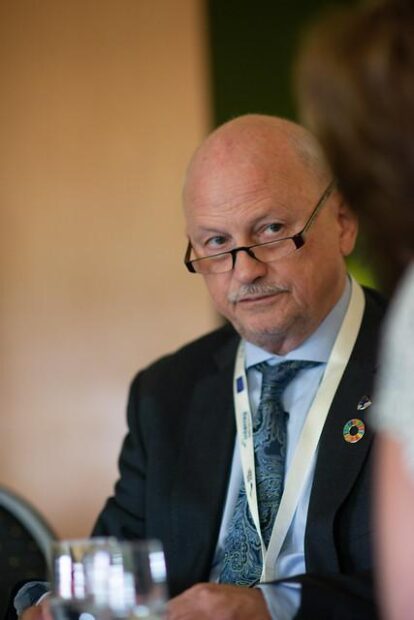Uwaga
Ten artykuł pochodzi z archiwum serwisu WWW i może nie spełniać kryteriów związanych z dostępnością definiowanych przez standard WCAG2.1AA.
Between 18 and 20 September 2019 Lithuanian city of Klaipeda will host 27th Annual Conference of Baltic Sea States Subregional Co-operation (BSSSC) focused this time on the sustainable maritime economy. It is another opportunity to meet, exchange knowledge, get inspired and undertake joint transregional initiatives contributing to the goals of European Union Strategy for Baltic Sea Region (EUSBSR). In the same time, these are primarily the regions around the Baltic which will have their say on urging Baltic issues.
‘In BSSSC we are very concerned about the development of the regions’, says Mr Roger Ryberg, current President of BSSSC. ‘We think that regions are very important in development all around Europe and we emphasise that. Regions are getting more and more involved in economic development, democratic involvement, youth issues. BSSSC is among the first organisations that take youth challenges very serious’.
Such a perspective is particularly valuable at times, when EUSBSR is under the process of revision and when some of the traditional Baltic cooperation frameworks have lost a bit their momentum. There are a lot of networks around BSR; however, sometimes the work done is not well coordinated, the undertakings, even if very needed and innovative do not have the expected impact. Maybe there are too many networks, too many strategies? And there is nothing specific about EUSBSR?
‘When I started the chairmanship, I used almost six months to get an overview fo myself who is who in the vast cooperation network in the Baltic Sea Region. There are many organisations with their goals, structures, etc. Besides, there are many regions taking part in these organisational structures. So how we can reduce bureaucracy and put more money into solving the real things? It is still unclear to me, admits Roger Ryberg. ‘However, I believe that the most important thing is that we now use more all the good people working in this system on the regional side. If it is too much state, it will take too much time.’
Certainly, one of the things that BSSSC mastered and could export as its best practice to other cooperation networks (not only in the Baltic Sea Region) is getting a profound youth involvement. Within BSSSC young people from all participating regions are given the platform to discuss the things the regular regions’ representative talk about, and they are given the opportunities to have an impact on the discussions, resolutions, etc.
‘Looking into the elections across the regions we see two trends: that there are those voting for right-wing parties, generally, because they feel not included in the society and the other trend, those who see the importance of the green solutions, screaming out loud about climate change and looking for fast actions. When we speak to the young ones, we see that similar discussions happen in every country, from the West to East, from North to South. Young people around Europe want to take part in them, and they propose solutions, so you as a politician, have to take the youth engagement seriously. And we in BSSSC really do it. That is why we put quite a lot of money to support the youth initiatives, for example the Baltic Youth Camp (red. organised just before the 10th Annual Forum of EUSBSR in Gdańsk in June 2019). The young people are not calm. They motivate with their scream for actions. So having youth aboard it very important’, concludes Mr Ryberg.
